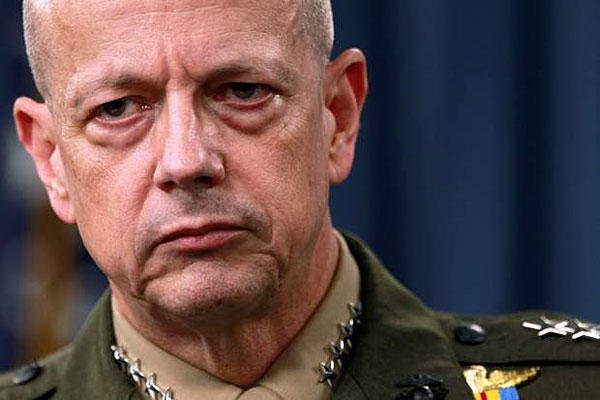The former commander of U.S. and NATO forces in Afghanistan said Friday the U.S. military should start scripting the end of wars before generals plan an invasion.
"We have plans that we write that have various phases to them. We have the escalation phase, then decisive operations -- which we do very well," said retired Marine Gen. John Allen. But after the combat phase, he said, there must be stability.
"The solution to the conflict, if you will, the war-winning mechanism, for a campaign like [Afghanistan], isn't the military outcome," Allen told a gathering Friday at The Stimson Center in Washington, DC. "The war-winning mechanism is how you posture in the post-conflict period the development of the indigenous capacity to govern."
"You don't just break things and leave," he said. "You have to envision phase four [governing], and I would contend that if you're writing a war plan, perhaps the thing you write first is phase four, because we're going to deliver ourselves to a point where we, ultimately, have to account for the outcome of hostilities and the outcome of decisive operations.
Allen didn't say the last phase was never fully thought out, but that was the implication during his talk, entitled "Lessons learned and insights from the field of operations, Afghanistan." He served as commander of International Security Forces-Afghanistan from 2011 to 2013.
In the case of Afghanistan, he predicts this last phase will continue for at least another decade, unless the international community -- failing to see progress in the country's governmental and social development -- pulls out.
Allen noted, however, that "the campaign in Afghanistan burst upon us like a storm." He said in the first days of the war in Afghanistan, President George W. Bush would never have predicted the U.S. would still have combat troops in Afghanistan 13 years later.
"President Bush, at that point, could not have adequately imagined what ultimately needed to be done, or what could be done, in the aftermath of that ... attack," Allen said.
Allen said he would not dispute reports that the Afghan government is fragile, but he believes it has reached a general commitment to security that it is able to "absorb the shock of crisis" when it occurs.
Allen offered praise for Afghan military leaders who had come of age during the decade prior to his assuming command of the international forces in 2011. He called them "patriots," saying those he encountered showed a loyalty to Afghanistan and not to their particular ethnic group or tribe.
He also said that he went to Afghanistan believing that the road to stability there went through Pakistan, which shared a long border and deep cultural connection with the Pashtu tribes of Afghanistan.
Based on the progress and development he has seen in Afghanistan, Allen said he now believes it is more likely the road to stability in Pakistan -- which has experienced its own tribal ruptures since 2001 -- may go through Afghanistan.
Notably, Allen didn't talk about government corruption in Afghanistan and the U.S.' strained relationship with Afghan President Hamid Karzai.
Allen recalled his confidence that the Loya Jirga -- the gathering of Afghan tribes to consider national and international matters -- would back the U.S.' post-2014 status of forces agreement with Afghanistan. This support from the traditional leaders was another indication that the people there are committed to building a stable, western-leaning Afghanistan.
Allen did not reiterate Karzai's opposition to the plan, which reportedly will fall to his successor -- after April elections -- to sign. Nor did Allen bring up Karzai's criticism of U.S. drone strikes that have killed civilians.




























